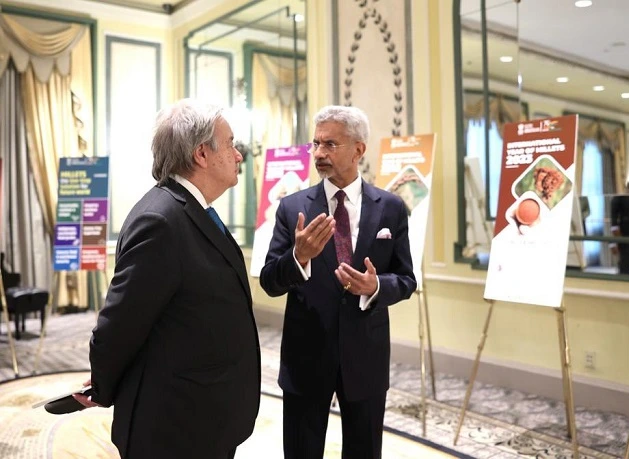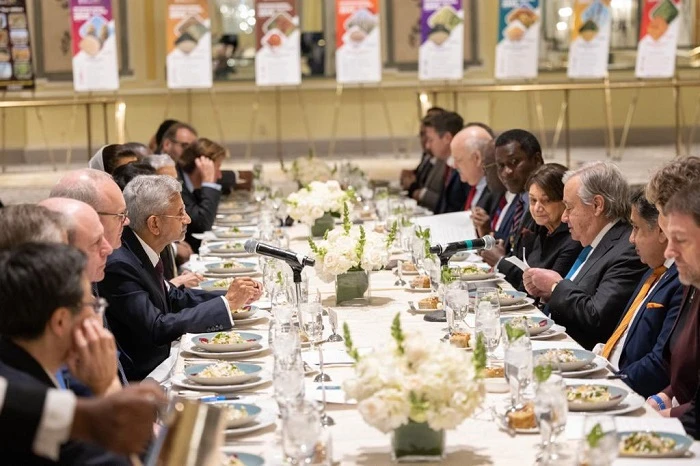

External Affairs Minister S Jaishankar with United Nations Secretary-General Antonio Guterres at the millets-based lunch in New York (Images courtesy: Twitter/@DrSJaishankar)
Heading into the International Year of Millets in 2023, External Affairs Minister S Jaishankar hosted United Nations Secretary-General Antonio Guterres and other members of United Nations Security Council (UNSC) for a millets-based lunch in New York on Friday.
As part of the vision and agenda of Prime Minister Narendra Modi, India has been at the forefront of backing the initiative as millets make a comeback with people valuing traditional, organic and indigenous food grains.
Millets, often called “Nutri-Cereals” encompass a diverse group of cereals and were among the first plants that were domesticated and have served as a traditional staple crop for millions of families in Sub-Saharan Africa and Asia.


India, which produces nine kinds of millets, has seen Bajra cultivation since ancient times and is a part of the diet to various states including Rajasthan, Uttar Pradesh, Haryana and Gujarat.
Millets provide high energy, high dietary fiber, proteins, many essential minerals, vitamins, and antioxidants, all of which play a substantial role in lowering diabetes. The diversity of millets offers opportunities for economic development through income-generating activities in the food sector.
Millets also grow on poor soils with little or no inputs, have a low carbon and water footprint, are resistant to many crop diseases and pests and can survive in adverse climatic conditions.
While millet cultivation has been historically widespread, their production is declining in many countries. There is an urgent need to promote the nutritional and ecological benefit of millets to consumers, producers, and decision-makers, to improve production efficiencies, research, and development investments and food sector linkages.
The commemoration of the International Year of Millets will help in creating greater awareness of millet production. It will contribute to food security, nutrition, ensuring livelihoods and incomes of farmers, poverty eradication and the achievement of the SDGs, particularly in regions that are drought prone or threatened by climate change. It will also help promote millets as a key component of the food basket.
Also Read: In message to FAO, PM Modi calls for a global mass movement to promote millets
Israel Defence Forces Spokesperson Brigadier General Effie Defrin on Thursday said that Iran has expressed…
India's Hindustan Aeronautics Limited (HAL) and French engine manufacturer, Safran Aircraft Engines, signed an agreement…
India has emerged as a country with the third-largest growth in power generation capacity globally…
Prime Minister Narendra Modi hailed Indian chess grandmaster Divya Deshmukh for defeating world number one…
The family of detained Baloch leader Mahrang Baloch has accused prison authorities at Quetta's Hudda…
The QS World University 2026 Rankings bring great news for our education sector, as the…